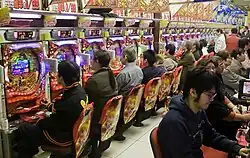パチンコ
Japanese

Etymology
Appears from the Taishō period in the early 1900s.
Compound of ぱちん (pachin, onomatopoeia for a small hard thing striking something else; compare English kaching) + 子 (-ko, suffix used to form nouns, often diminutive).
A pinball-like children's game was first called ガチャンコ (gachanko) of similar derivation, with this more gambling-oriented machine becoming popular from around 1947.[1]
Noun
パチンコ • (pachinko)
References
- Shōgaku Tosho (1988) 国語大辞典(新装版) [Unabridged Dictionary of Japanese (Revised Edition)] (in Japanese), Tōkyō: Shogakukan, →ISBN
- Matsumura, Akira, editor (2006), 大辞林 [Daijirin] (in Japanese), Third edition, Tōkyō: Sanseidō, →ISBN
- NHK Broadcasting Culture Research Institute, editor (1998), NHK日本語発音アクセント辞典 [NHK Japanese Pronunciation Accent Dictionary] (in Japanese), Tōkyō: NHK Publishing, →ISBN
This article is issued from Wiktionary. The text is licensed under Creative Commons - Attribution - Sharealike. Additional terms may apply for the media files.